EU Landfill Directive bans all scrap tires from landfills as of July 16, 2006
 London, UK - All 16 shredder operating companies in the UK are to ban tyres from their feedstock, the British Metals Recycling Association has announced.
London, UK - All 16 shredder operating companies in the UK are to ban tyres from their feedstock, the British Metals Recycling Association has announced.The ban could mean that more tyres are flytipped by some vehicle dismantlers who do not have arrangements for recycling or recovery, which can cost about £100 per tonne of tyres. On a day-to-day basis it will mean shredder operators turning away deliveries of end-of-life vehicles (ELVs) with tyres still on them, or loads which contain tyres baled within scrap cars.
Suppliers found to deliberately conceal tyres in loads or bales will not be tolerated, and defaulters may find themselves banned - Lindsay Millington, BMRA
Shredder operators run heavy machinery which shreds the end-of-life vehicles into metals as well as non-metallic material known as shredder residue. It is difficult to separate the rubber from the wire in tyres and so collection of the material is not seen as viable after shredding takes place.
Ban
From July 16, a ban on the landfilling of shredded tyres comes into force under the Landfill Directive and this means that the shredder operators will no longer be able to landfill shredder residue if it includes tyres. Some of the residue could still be used in landfill as an engineering material, but the Environment Agency is expected to limit this to particular sites.
Lindsay Millington, director general of the British Metals Recycling Association, said that the shredders’ ban will come into force from July 7, 2006, and the only exception will be where there is an identified end-market and the operator agrees in advance to take a delivery of tyres.
She promised that there would be “a crack down on illegal operators who flout the end-of-life vehicle regulations requirement that tyres must be removed as part of the depollution process. BMRA shredder operators have agreed a common position that suppliers found to deliberately conceal tyres in loads or bales will not be tolerated, and defaulters may find themselves banned.”
Ms Millingon added: “Our shredder operators feel it is important to take a responsible position, and we are working closely with the Environment Agency towards a very significant reduction of tyres in shredder waste. However we will only achieve complete eradication when all the loopholes are closed to prevent illegal ELV activity. We are therefore also working on a longer term action plan with government partners towards this goal.”
Slow
Despite the ban by shredder operators from July 7, some in the sector consider that the shredder industry has been slow to regulate the number of tyres coming into yards.
One observer remarked: “Shredders have been keen to take in as much metal material as possible and have never really bothered to try and reduce the number of tyres coming in in the past. This has worked against those dismantlers who conform to all the depollution regulations and take the tyres off in advance.” BMRA has had a policy for its members to charge £1.50 for each tyre delivered, but it is not thought that this has been widely enforced.
Duncan Wemyss, director of the Motor Vehicle Dismantlers Association, said: “A large number of MVDA members have already found established outlets for the disposal of tyres and are not reliant on the use of shredders. All parties now need to act with some practicalities and responsibility to ease the situation.”
Competition
Mr. Wemyss said that he could foresee some regional difficulties and that members were also finding that used tyres were competing against other waste products for disposal routes.
“Some of the outlets for tyres, such as for recovery in cement kilns, are under competition from waste oil and also from municipal waste with MBT material being sent to the kilns for energy recovery,” he said.
The Department of Trade and Industry and the Environment Agency will be watching the situation closely over coming months and there are some contingency plans should local difficulties arise. However, the DTI is thought to consider that there is a sufficient number of outlets for the tyres, although further development of outlets is also necessary.
*The 16 shredder operating companies are: England: EMR, Sims, Norton, Easco, Dunn Bros, CD Jordan, Ampthill Metals, H. Williams, TJ Thomson, Morecambe Metals, BW Riddle; Scotland: John Adam, Christies, J Lawries; Northern Ireland: Clearway. Hegartys in the Irish Republic are also expected to enforce the ban.
You can return to the main Market News page, or press the Back button on your browser.

